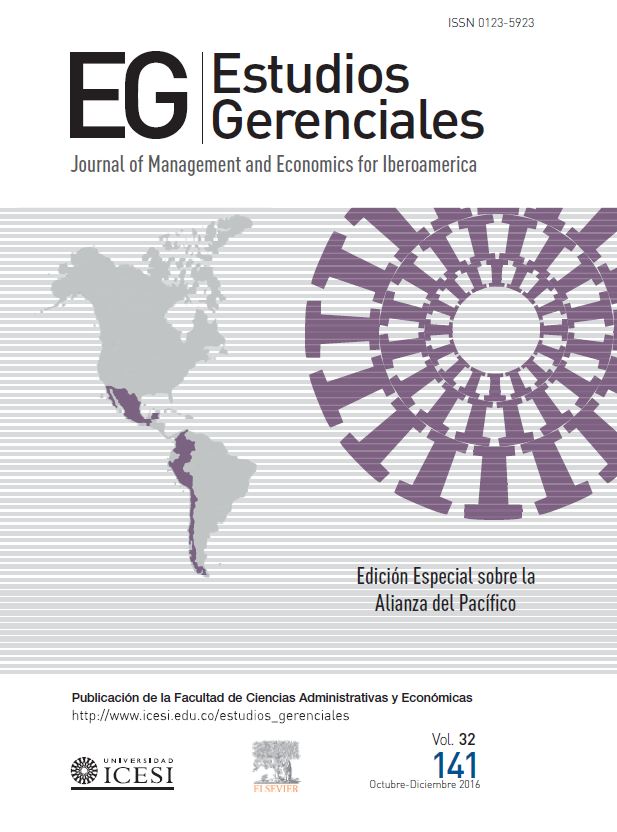Factors associated with learning management in Mexican micro-entrepreneurs
DOI:
https://doi.org/10.1016/j.estger.2016.10.003Palavras-chave:
Microenterprises, Knowledge, Learning abilityResumo
The learning capacity of social based Mexican micro-entrepreneurs to generate new knowledge and incorporate it to its products and services is evaluated. The above is done through a confirmatory factor analysis and structural linear equation system, and the presence of static and dynamic dimensions in learning capacity, which are represented by individual stocks and flows of knowledge. The positive relationship between them demonstrates the presence of learning processes that impact positively their economic performance.
Downloads
Referências
Bates, T. (1990). Entrepreneur human, capital inputs and small business longevity. The Review of Economics and Statistics, 72(4), 551–559.
Becker, G. (1962). Investment in human capital: A theoretical analysis. The Journal of Political Economy, 70(5), 9–49.
Black, S., & Lynch, L. (1996). Human capital investment and productivity. The American Economic Review, 86(2), 263–267.
Brown, J., & Duguid, P. (1991). Organizational learning and communities-of-practice: Toward a unified view of working, learning, and innovation. Organization Science, 2(1), 40–57.
Cohen, W., & Levinthal, D. (1990). Absorptive capacity: A new perspective on learning and innovation. Administrative Science Quarterly, 35(1), 128–152.
Dogson, M. (1993). Organizational learning. A review of some literatures. Organization Studies, 14(3), 375–394.
Easterby-Smith, M., Snell, R., & Gherardi, S. (1998). Organizational learning: Diverging communities of practice? Management Learning, 29(3), 259–272.
Estrada, S., & Dutrénit, G. (2007). Gestión del Conocimiento en PYMES y desempeño competitivo. Engevista, 9(2), 129–148.
Fiol, C., & Lyles, M. (1985). Organizational learning. Academy of Management Review, 10(4), 803–813.
Fondas, N., & Wiersema, M. (1997). Changing of the Guard: The influence of CEO socialization on strategic change. Journal of Management Studies, 34(4), 561–584.
Gómez, M. (2003). Desarrollo de un Modelo de evaluación de la Gestión del Conocimiento en empresas de manufactura (Tesis doctoral). Universidad Politécnica de Madrid.
Grant, R. M. (1997). The knowledge-based view of the firm: Implications for management practice. Long Range Planning, 30(3), 450–454.
Hamel, G., & Prahalad, C. K. (1993). Strategy as stretch and leverage. Harvard Business Review, 71(2), 75–84.
Jovanovich, B., & Yaw, N. (1995). A Bayesian learning model fitted to a variety of empirical learning curves. In M. Neil (Ed.), Brookings papers of economic activity: Microeconomics 1995 (pp. 247–305). Washington, DC: Brookings Institution Press.
Lant, T., & Mezias, S. (1992). An organizational learning model of convergence and reorientation. Organization Science, 3(1), 47–71.
Levinthal, D., & March, G. (1993). The myopia of learning. Strategic Management Journal, 14, 95–112.
Levitt, B., & March, J. (1988). Organizational learning. Annual Review of Sociology, 14, 319–340.
Machorro, A. (2008). Gestión del Conocimiento y la Tecnología en la pequeña y mediana empresa mexicana. Revista de Alta Tecnología y Sociedad, 2(1), 1–11.
Maldonado, G., & Martinez, M. (2012). Gestión del conocimiento y crecimiento en la Pyme manufacturera de Aguascalientes (México). Cuadernos de Administración, 28(47), 25–36.
Marquardt, M. J. (1999). Action learning in action. Transforming problems and people for world-class organizational learning. Palo Alto: Davies Black Publishing. Mensinas, C. (2010). Gestión del Conocimiento: Medición del Aprendizaje manufacturero en pymes de Hermosillo. Retrieved from http://www.eumed.net/libros-gratis/2010b/685/MEDICION%20DEL%20APRENDIZAJE%20MANUFACTURERO%20EN%20PYMES%20DE%20HERMOSILLO%
Mungaray, A. (1997). Organización industrial de redes de subcontratación para pequeñas empresas en la frontera norte de México. Ciudad de México: Nacional Financiera.
Mungaray, A. (2002). Aprendiendo del Mercado. Una experiencia de reciprocidad universitaria en apoyo a las microempresas mexicanas. Tendencias, 3(1), 85–106.
Mungaray, A., & Ramírez, M. (2007). Capital humano y productividad en microempresas. Investigación Económica, 66(260), 81–115.
Mungaray, A., Ramírez, N., Ramírez, M., & Texis, M. (2010). Aprendizaje empresarial en microempresas de susbsistencia. Ciudad de México: M.A.Porrúa-UABC.
Muñoz Seca, B., & Riverola, J. (1997). Gestión del Conocimiento. Barcelona: Folio.
Nonaka, I. (1994). A dynamic theory of organizational knowledge creation. Organization Science, 5(1), 14–37.
Nonaka, I., & Takeuchi, H. (1995). The knowledge creating company. New York: Oxford University Press.
Prieto, I. (2003). Una valoración de la Gestión del Conocimiento para el desarrollo de la capacidad de aprendizaje en las organizaciones: una propuesta de un modelo integrador (Tesis doctoral). Universidad de Valladolid.
Ramírez, M., Texis, M., & Aguilar, J. G. (2014). El papel del capital humano y el aprendizaje en las microempresas de base social en Baja California. Estudios Fronterizos, Nueva Época, 15(29), 207–245.
Ramírez, N., Mungaray, A., Ramírez, M., & Texis, M. (2010). Economías de escala y rendimientos crecientes: una aplicación en microempresas mexicanas. Economía Mexicana, Nueva Época, 19(2), 213–230.
Senge, P. M. (1990). The fifth discipline. New York: Doubleday. Shultz, T. (1961). Investment in human capital. The American Economic Review, 51(1), 1–17.
Stefanou, S. E., & Saxena, S. (1988). Education, experience and allocative efficiency: A dual approach. American Journal of Agricultural Economics, 70(2), 338–345.
Texis, M., Mungaray, A., Ramírez, M., & Ramírez, N. (2011). Aprendizaje en microempresas de Baja California. Estudios Fronterizos, 12(23), 95–113.
Texis, M., & Ramírez, M. (2015). Evaluación del aprendizaje de las microempresas de Baja California. Región y Sociedad, 64, 261–279.
Wiig, K. M. (1997). Roles of knowledge-based systems in support of knowledge management. Boca Raton: CRC Press.
Young, R., Joe, F., & Christopher, Y. (1993). Innovation, high-technology use, and flexibility in small manufacturing firms. Growth and Change, 24(1), 67–86.
Downloads
Publicado
Edição
Seção
Licença
Os autores dos artigos serão responsáveis dos mesmos e, assim, não comprometam os princípios ou políticas da Universidade Icesi nem do Conselho Editorial da revista Estudios Gerenciales. Os autores autorizam e aceitam a transferência de todos os direitos para a revista Estudios Gerenciales para a publicão impressa ou eletrônica. Após a publicação do artigo, pode ser reproduzido sem a permissão do autor ou da revista, se mencionar o(s) autor(es), o ano, o título, o volume e o número e o intervalo de páginas da publicação, e Estudios Gerenciales como fonte (se abster de utilizar Revista Estudios Gerenciales).








